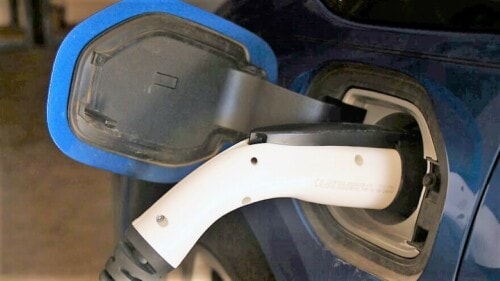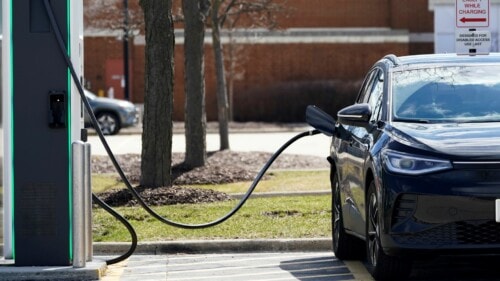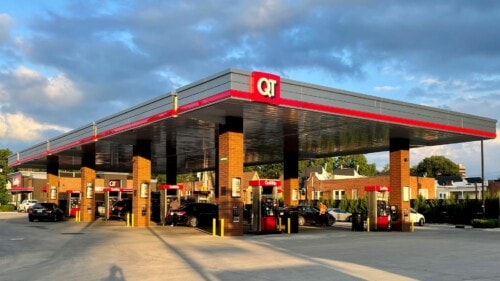Soaring Gas Prices Put a Charge into Electric Vehicle Sales Access to Charging Stations Remains a Challenge
Published July 14th, 2022 at 6:00 AM
Above image credit: A detail view of a motorist charging their vehicle with a Tesla urban supercharger, Sunday, June 12, 2022, in Kansas City, Missouri. Electric vehicle sales continue to rise nationwide amidst surging gas prices. (Aaron M. Sprecher | AP)Despite recent declines at the pump, this year’s surge in gasoline prices continues to send tremors through the economy. One consequence is the growing popularity of electric vehicles.
In Missouri, the average gallon of gasoline was $4.37 on Wednesday, less than the national average of $4.63, according to AAA. The average price in Kansas was $4.44 per gallon.
AAA this week reported that the national average price for gas had declined 32 cents over the past month, but remained $1.53 per gallon higher than a year earlier.
Such persistently high prices in recent months continue to crimp demand for gas. Total demand for gasoline during the week ending July 8 was 8.06 million barrels, down 13.2% from the same week last year, according to data released Wednesday by the U.S. Energy Information Administration.
The AAA hopes that such demand destruction will offer some relief to drivers at the pump. Longer term, though, such shifts may also reflect the growing popularity of Electric Vehicles.
Sam Billen, is one of them who thinks EV is the future. The Primary Color Music owner brought his Tesla Model Y in 2020. Apart from other benefits, environmental factors played a key role in his decision to get an EV.
“Right now the most obvious benefit is the cost of gas,” Billen said. “However, it was not at the time of buying it. But again, I am happy that I have an EV with the gas prices where they are currently.”
Electric vehicle sales in the U.S. rose to nearly 477,000 in 2021, an 81.5% increase over 2020 sales, according to AAA data. Despite surging sales, EVs are still only 3.3% of total vehicle sales.
Globally, electric vehicles sales more than doubled in 2021, to 6.6 million.
Dough Smith, president of the Missouri Automobile Dealers Association, attributes recent sales growth to a combination of high fuel prices and consumer curiosity about electric vehicles.
“Fuel prices at record highs are certainly making the option to an electric vehicle more of a factor for average Missouri drivers,” Smith said. “Couple that with the fact there are more EV options across all manufacturers than ever in the history of the automobile, and this is why interest in them is at an all-time high.”
U.S. Department of Energy data shows that Missouri had 10,050 registered electric vehicles at year-end 2021. New EV purchases now account for about 4% of sales, up from less than 1% just a couple of years ago.
“Our electric vehicle market is steadily improving each year,” Smith said. “And if you did not have the supply and manufacturing constraints with all vehicle manufacturers I think EV purchases would be even higher.”
A compact electric vehicle is more expensive than its gas-powered counterpart. A study by the AAA found that the overall cost of electric vehicle ownership is 8%, or $590, more per year than a traditional gas-powered vehicle, though fuel and maintenance are lower.
Nick Chabarria, public affairs specialist with AAA Missouri, broke down the fuel and maintenance numbers.
“The electricity required to drive 15,000 miles per year in a compact electric vehicle costs an average of $546, while the amount of gas required to drive the same distance costs $1,255 (or 130%) more. Electric vehicles have maintenance costs of $330 less than gas-powered cars, a total of $949 annually.”
Jim Clevenger can vouch for the savings on maintenance. The founder of Hoarding Cleanup Pros has been running his Tesla Model 3 since May 2019.
“I have had this vehicle for three years, and I have just recently put on a new set of tires,” Clevenger said. “That is it. I don’t need any other maintenance.”
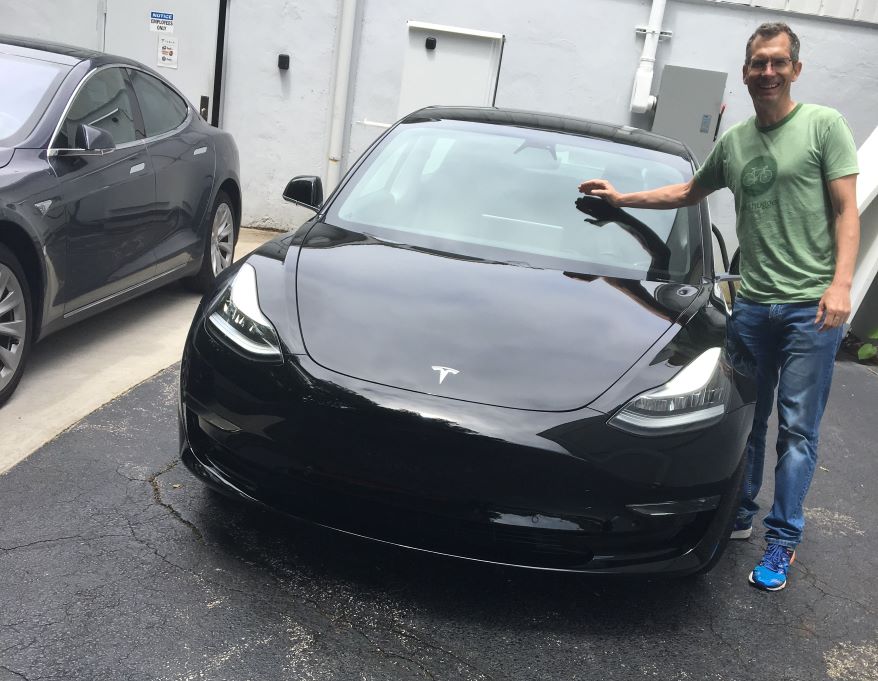
“I think they may suggest … changing out the fluid, and the coolant around the battery, and at that time, I will check the brakes too. But I do not think that the brakes are going to be needed for any work.”
Beyond reduced maintenance costs, Clevenger said he prefers an eclectic vehicle because it is quicker and more responsive.
However, range anxiety is a major concern with electric vehicles, particularly in far-flung areas such as the heartland. AAA research shows that 57% of drivers feel electric vehicles are not suitable for long-distance travel like road trips, as they are concerned about running out of charge when they drive.
Mely Chavez is one of them. The Crossroads resident has been driving her Nissan Leaf since February 2016. But she doesn’t necessarily argue that having an electric vehicle is essential.
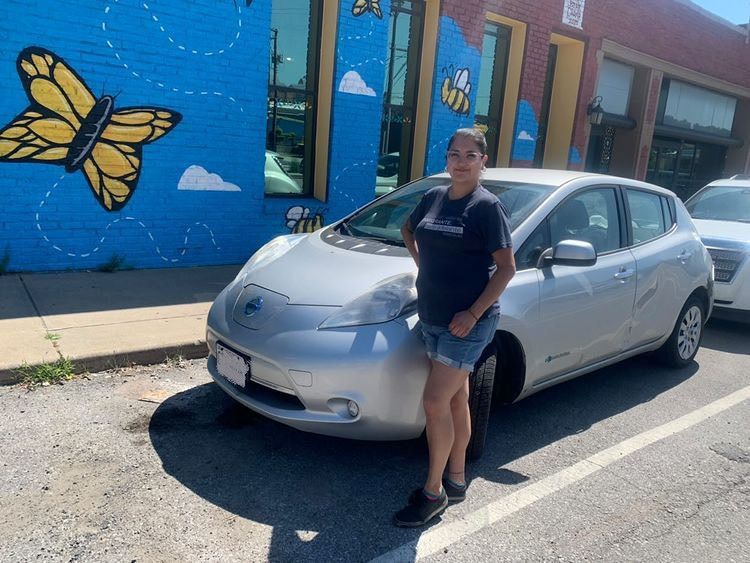
“It depends,” Chavez said. “It is worth it if you live within city limits and do not have to drive so far or if you are using it on occasion as a secondary car. Since my car is older, the battery does not charge up how it used to.”
The availability of charging stations also is a concern for Chavez.
“I wish we had more,” she said. “With people switching to EV spaces are sometimes limited or gas cars park at the charging station. That prevents me from being able to charge. They are mostly available within city limits, there are a few scattered outside. But that limits where I can go sometimes.”
According to AAA data, as of May 2021, 46,104 public charging stations in the U.S. offered a mix of Level 1, 2 and Fast Charging (Level 3). Among those 985 were in Missouri.
Smith, with the dealers association, agreed that access to charging stations is a significant constraint on the emerging EV market.
“Access to a functioning charging station is a must for widespread EV adoption,” he said.
“Missouri is getting much better at the access and is building and planning to build stations all over the state. In my estimation, you will need EV fast-charge stations about every 50 miles to ease the concerns of Missouri EV drivers and potential buyers. We are not there yet, but we are making strides.”
Saurav Rahman is a 2022 visiting fellow through the Alfred Friendly Press Partners program, which provides hands-on training in U.S. and international newsrooms and within the Missouri School of Journalism. He is a senior reporter for Maasranga Television in Bangladesh.



